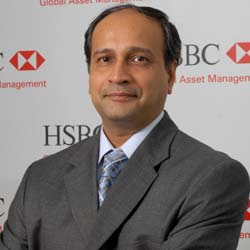Tushar Pradhan, Chief Investment Officer, HSBC Mutual Fund reviews Fooled by Randomness written by Nassim Nicholas Taleb
 There have been many books that have influenced my thinking. Even listing them would prove quite a gargantuan task so I will talk about a book that has been thought provoking for me and in many ways has shaped the manner in which I think about the world.
There have been many books that have influenced my thinking. Even listing them would prove quite a gargantuan task so I will talk about a book that has been thought provoking for me and in many ways has shaped the manner in which I think about the world.
The book is titled “Fooled by Randomness” and is written by Nassim Nicholas Taleb, now more popular for his recent book, The Black Swan.
Fooled by Randomness is a treatise on how human beings and their penchant for quantifying the world get them into trouble. As we all know the “bell curve” or a normal Gaussian distribution describes almost everything we know. This could be a set of observations regarding a range of activities from socio economic behavior to how birds choose their dwellings to education to even the stock market. However, when we analyze the data, the extreme event observation is deleted and a generic equation describing the event is presented as the outcome. The argument hereon becomes more of a selective view of history. Hence, any predictions for the future based on such data can only be fraught with the danger that we have excluded events likely to occur in the future while analysing this past data.
The book also talks about how statistics are used to change perception and when reality intrudes on such a cozy view of the world, people are quick to blame “six sigma” events. The author’s imaginative attempt to question the very tenet of contemporary analytic frameworks is very appealing. However, he does stop short of providing a remedy. But the key lessons from the book that all statistical inferences needs to be taken with a pinch of salt and that people should not sacrifice common sense, logic and a sense for the overall reality at the altar of mathematical or more specifically statistical perfection are hopefully never forgotten.
The author also counsels that most people attribute their individual successes, whether in life or in the stock market to their own actions when that success could also equally be the outcome of absolutely random events. As a believer in the theory of karma, I intuitively think he is very close to the truth. Overall, this book is a treasure for all those who believe that linear functions are only a subset of many other functions that describe the world we live in and that we indeed may be living in a non-Gaussian world.





